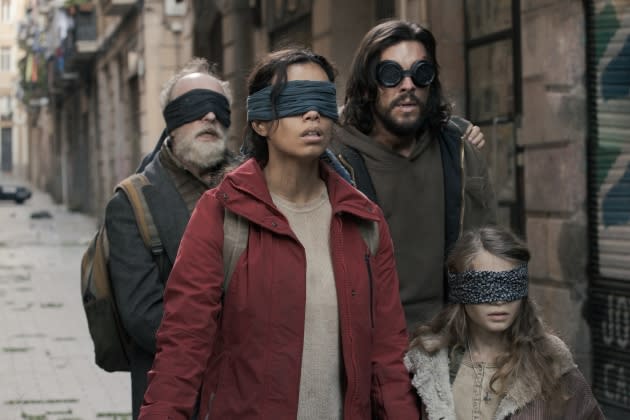‘Bird Box Barcelona’ Review: A Dystopian Sci-Fi Redux, With Less Punch This Time

Five years ago seems aeons in an era so disrupted by COVID. So it comes as a surprise to realize that the original screen “Bird Box” arrived a full 14 months or so in advance of pandemic restrictions — becoming an early Netflix pop-culture phenomenon before lockdown made that sort of thing a regular occurrence. Susanne Bier’s film of Josh Malerman’s sci-fi horror novel was intriguing and suspenseful enough, even if its emphasis on psychological drama over thrills made for a somewhat unlikely breakout hit.
Inevitably, if belatedly, there’s now a follow-up — but not an adaptation of Malerman’s own print sequel, which continued the travails of the character played by Sandra Bullock. Instead, “Bird Box Barcelona” is a “parallel story” set on another continent entirely. Written and directed by Alex and David Pastor, whose prior genre efforts “The Last Days” (2013) and “Carriers” (2009) both had similar basic premises, it finds a different cross-section of humanity imperiled by unseen but presumed space aliens. When glimpsed, they induce immediate, overwhelming suicidal urges — or, in a chosen few, mind-controlled subservience that drives them to lead unsuspecting others to their doom.
More from Variety
California Extends Film Tax Credit as New Jersey Expands Incentive to Lure Netflix Studio
Mark Normand Sets Netflix Comedy Debut With 'Soup to Nuts' Special (EXCLUSIVE)
Lightning was unlikely to strike twice, particularly since the 2018 edition’s popularity was abetted by the “Bird Box Challenge,” a short-lived craze in which fans blindfolded themselves like the screen characters, leadin to some unfortunate real-life mishaps. Still, you could see the film, with its numerous narrative ambiguities and unresolved issues, extending fruitfully into additional chapters.
It turns out that “Barcelona” is a bit of a dead tree limb, however. Though slick and more expansive in some ways, with bigger action sequences, it proves an overlong, uninvolving entry, in which any attempted fresh wrinkles to this fantasy universe offer scant viewer reward. Premiering on Netflix worldwide on July 14, it also makes a key miscalculation that drags the whole enterprise downward almost from the start.
Things start out like a father-daughter version of “The Road,” with erstwhile wind-power engineer Sebastian (Mario Casas, who also starred in the Pastor brothers’ 2020 “The Occupant”) and young Anna (Alejandra Howard) trying to endure in a collapsed society nine months after the crisis first struck. After they’re set upon by marauding blind people — the sole minority immune to this visually maddening menace — he’s left wounded, and seeks help from a group of friendlier if wary strangers holed up in a large transit complex. (Whatever they are, the “entities” apparently can’t open a door or window on their own, so any shut interior is safe from them.)
But Sebastian has a hidden agenda, and even Anna isn’t quite what she seems. Making their acquaintance turns out to be bad luck for these new friends, after which our protagonists move on to infiltrate another set of survivors. Living in an old bomb shelter, that next mini-tribe includes welcoming Claire (Georgina Campbell from “Barbarian”), who also has a little girl named Sofia (Naila Schubert) in her charge, and Octavio (“Babylon’s” Diego Calva), who regards Sebastian with considerably more suspicion.
Meanwhile, as in the earlier film, albeit in somewhat more garbled fashion, there are flashbacks to earlier events. These include the chaotic onset of the “epidemic” (encompassing a subway sequence reminiscent of Sion Sono’s 2001 “Suicide Club”) and an explanation of what happened to Anna’s mother. They also introduce a sinister cleric (Leonardo Sbaraglia), who later becomes entirely the wrong sort of Messianic figure.
But none of this is all that engaging, despite a capable cast, impressive production scale and heightened if uneven action content. (The most overwrought setpiece involves a runaway bus.) We still never actually see the “entities,” which would be fine if the film didn’t keep promising revelations about this malevolent force that never actually come into focus. Even some final emphasis on the “science” in science-fiction only seems introduced to tease another sequel, leaving the primary global menace a near-complete mystery.
The biggest error “Bird Box Barcelona” makes, however, lies in resting the entire narrative weight on a protagonist whom we soon realize is an unsympathetic one. A Judas character always intrigues, at least theoretically. But major Spanish star Casas isn’t granted the complexity of writing needed for Sebastian to assume the dimensions of tragic conflict, so patience thins as we realize he’s simply going to repeat prior behaviors on successive new figures.
Accomplished in all tech and design departments, “BBB” nonetheless never quite ignites. The dangers of sight and occupying open space are just plot-device givens now, while expected resolutions to Part One’s many dangling questions never arrive. Even the shock of suicidal violence feels dulled here. It’s no outright disaster, but this follow-up is uninspired enough to negate any lingering curiosity about what else might be left inside the “Box.”
Best of Variety
Sign up for Variety’s Newsletter. For the latest news, follow us on Facebook, Twitter, and Instagram.

 Yahoo Movies
Yahoo Movies 